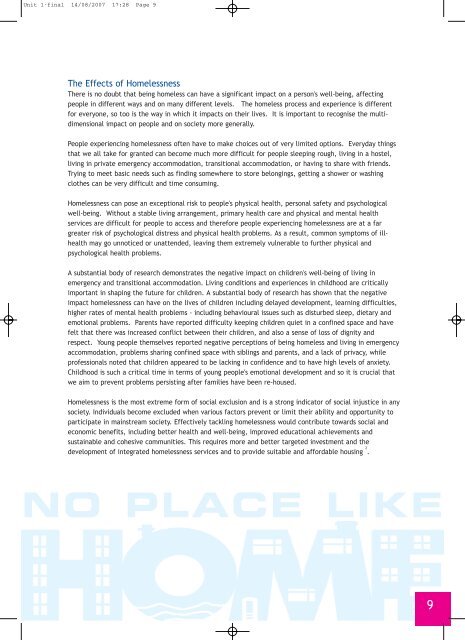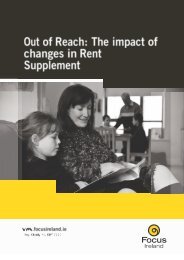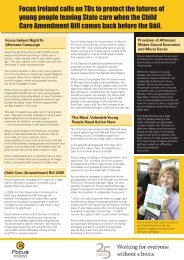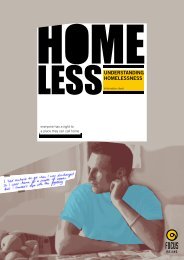Download No Place Like Home resource here - Focus Ireland
Download No Place Like Home resource here - Focus Ireland
Download No Place Like Home resource here - Focus Ireland
- No tags were found...
You also want an ePaper? Increase the reach of your titles
YUMPU automatically turns print PDFs into web optimized ePapers that Google loves.
Unit 1-final 14/08/2007 17:28 Page 9The Effects of <strong>Home</strong>lessnessT<strong>here</strong> is no doubt that being homeless can have a significant impact on a person's well-being, affectingpeople in different ways and on many different levels. The homeless process and experience is differentfor everyone, so too is the way in which it impacts on their lives. It is important to recognise the multidimensionalimpact on people and on society more generally.People experiencing homelessness often have to make choices out of very limited options. Everyday thingsthat we all take for granted can become much more difficult for people sleeping rough, living in a hostel,living in private emergency accommodation, transitional accommodation, or having to share with friends.Trying to meet basic needs such as finding somew<strong>here</strong> to store belongings, getting a shower or washingclothes can be very difficult and time consuming.<strong>Home</strong>lessness can pose an exceptional risk to people's physical health, personal safety and psychologicalwell-being. Without a stable living arrangement, primary health care and physical and mental healthservices are difficult for people to access and t<strong>here</strong>fore people experiencing homelessness are at a fargreater risk of psychological distress and physical health problems. As a result, common symptoms of illhealthmay go unnoticed or unattended, leaving them extremely vulnerable to further physical andpsychological health problems.A substantial body of research demonstrates the negative impact on children's well-being of living inemergency and transitional accommodation. Living conditions and experiences in childhood are criticallyimportant in shaping the future for children. A substantial body of research has shown that the negativeimpact homelessness can have on the lives of children including delayed development, learning difficulties,higher rates of mental health problems - including behavioural issues such as disturbed sleep, dietary andemotional problems. Parents have reported difficulty keeping children quiet in a confined space and havefelt that t<strong>here</strong> was increased conflict between their children, and also a sense of loss of dignity andrespect. Young people themselves reported negative perceptions of being homeless and living in emergencyaccommodation, problems sharing confined space with siblings and parents, and a lack of privacy, whileprofessionals noted that children appeared to be lacking in confidence and to have high levels of anxiety.Childhood is such a critical time in terms of young people's emotional development and so it is crucial thatwe aim to prevent problems persisting after families have been re-housed.<strong>Home</strong>lessness is the most extreme form of social exclusion and is a strong indicator of social injustice in anysociety. Individuals become excluded when various factors prevent or limit their ability and opportunity toparticipate in mainstream society. Effectively tackling homelessness would contribute towards social andeconomic benefits, including better health and well-being, improved educational achievements andsustainable and cohesive communities. This requires more and better targeted investment and thedevelopment of integrated homelessness services and to provide suitable and affordable housing 2 .NO PLACE LIKE9
















